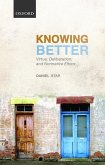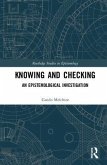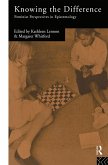Originally published in 1990, this book deals with the question of akrasia, weakness of will, or knowing better but doing worse. Versions of this principle are presupposed by Socrates and Plato, articulated as the 'practical syllogism' in Aristotle and play a central role in modern decision theory. The book considers the psychological explanation for this and different responses to the problem. The work is of interest not only as a piece of classical scholarship, action theory and moral psychology, but as a piece of meta-philosophy, and the philosophy about the methodology of philosophical disputes. It has enduring relevance as the problem of akrasia continues to be the object of much philosophical argument.
Hinweis: Dieser Artikel kann nur an eine deutsche Lieferadresse ausgeliefert werden.
Hinweis: Dieser Artikel kann nur an eine deutsche Lieferadresse ausgeliefert werden.








